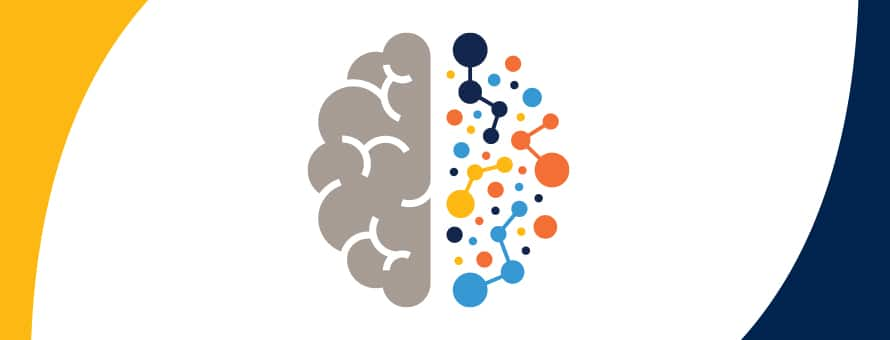Is Psychology a Science?

Know before you read
At SNHU, we want to make sure you have the information you need to make decisions about your education and your future—no matter where you choose to go to school. That's why our informational articles may reference careers for which we do not offer academic programs, along with salary data for those careers. Cited projections do not guarantee actual salary or job growth.
Although many people who studied psychology may work in jobs that perhaps do not, on the surface, seem “scientific,” the practice and education of psychology is guided by research findings that are firmly grounded in the scientific method.
Psychology is commonly recognized as a social science, and is included on the National Science Foundation’s (NSF) roster of recognized Science, Technology, Engineering and Mathematics (STEM) disciplines. There are some types of psychology that align with natural sciences, too, such as neuropsychology, which is the study of the brain’s influence on behavior.
Psychology as a Science
Many psychology undergraduate programs are shaped by the goals laid out in the American Psychology Association’s (APA) "Guidelines for the Undergraduate Psychology Major", said Dr. Michelle Hill, academic associate vice president at Southern New Hampshire University (SNHU).
Goal two of the APA guidelines version 3.0 is “Scientific Inquiry and Critical Thinking,” which includes the following four subgoals (APA PDF Source)
- Exercise scientific reasoning to investigate psychological phenomena
- Interpret, design and evaluate psychological research
- Incorporate sociocultural factors in scientific research practices
- Use statistics to evaluate quantitative research findings
More widespread recognition of psychology as a science is one of the points of emphasis in the APA guidelines, Hill said.
A Scientific Discipline
 “Professionals in the field who ‘do psychology’ (e.g. research, teaching, psychotherapy) understand that psychology is a scientific discipline,” said Dr. Nickolas Dominello, senior associate dean of social science programs at SNHU. Before assuming his current role, Dominello began his career in education teaching high school courses, such as Advanced Placement (AP) Psychology. This position allowed him to combine his love of education with his passion for psychology.
“Professionals in the field who ‘do psychology’ (e.g. research, teaching, psychotherapy) understand that psychology is a scientific discipline,” said Dr. Nickolas Dominello, senior associate dean of social science programs at SNHU. Before assuming his current role, Dominello began his career in education teaching high school courses, such as Advanced Placement (AP) Psychology. This position allowed him to combine his love of education with his passion for psychology.
According to Dominello, psychology’s status as a science is grounded in the use of the scientific method. Psychologists base their professional practice in knowledge that is obtained through verifiable evidence of human behavior and mental processes. Psychological studies are designed very much like studies in other scientific fields. It is through these studies that psychologists contribute to the body of research in their field.
Learning to design these studies and interpret the findings is a significant part of psychology education. As an undergraduate student, Dominello said, you can learn to develop a research question, select a data collection method and have the opportunity to design and refine a hypothetical research investigation.
![]()
“The subject of psychological science, behavior and mental processes is vast and complex,” Dominello said. “Therefore, establishing conclusive evidence is challenging. Psychological research is cyclical, and published research findings often spawn additional inquiries. Each 'brick' of knowledge contributes to the overall structure of knowledge for a particular phenomenon.”
So, if psychologists agree that psychology is a science, where does the confusion come from? What prompts some people to think of psychology as a soft science?
“I feel that in part, this misrepresentation of psychology stems from the diversity within the field (i.e. the various subfields) and the fact that psychological science findings often lead to more questions and avenues of future research," Dominello said. "This contrasts with some of the more traditional sciences that only search for concrete, definitive answers.”
Find Your Program
Research Methods in Psychology
Psychology also utilizes a wider array of qualitative methods than some traditional sciences.
“Although qualitative research provides a different route to understanding than traditional quantitative methods, I feel that is also ‘scientific,’ just grounded in different philosophical underpinnings," Dominello said.
Research methods can be categorized as either quantitative or qualitative:
- Quantitative research: Results in numerical data that can be analyzed.
- Qualitative research: Employs methods like questionnaires, interviews and observations that can be analyzed by grouping responses into broad themes.
The melding of quantitative and qualitative methods is essential to understand the human factor inherent in psychology.
“Psychology as a science embraces this broader exploratory perspective in order to better understand human phenomena. When merged, qualitative data can breathe life into quantitative data,” Dominello said.
The integration of different research approaches highlights the versatility of psychology as a discipline. According to Hill, psychology's uniqueness lies in its ability to add breadth and depth of knowledge across various fields.
“We are all curious about understanding human behavior to some extent, whether it’s one’s own behavior or the behavior of others,” Hill said.
This rich combination of qualitative and quantitative skills makes psychology a good undergraduate degree that can prepare you for a wide array of careers.*
With a bachelor’s degree in psychology you could consider careers in social services, education, human resources and medical fields, using your education and skills as a foundation for understanding and working with others, Dominello said.*

Where the Science of Psychology Can Be Applied
Hill said that a psychology undergraduate program’s focus on effective communication, information literacy and understanding human behavior can lend itself to many areas outside psychology, including sales, marketing and many others.*
If you're interested in becoming a psychologist or working in academic research, you'll likely need to pursue additional education beyond a bachelor’s degree, including a master's degree in psychology and often a PhD. (A doctorate in psychology is not currently offered at SNHU.)
Advancing your education in psychology often involves a strengthening of research skills, and an increased focus on the scientific method and the design of research studies, according to Dominello.
So, is psychology a science? The short answer is yes, but the long answer is much more expansive and flexible. Psychology begins with the scientific method, and researchers employ many of the same methods as their colleagues in the natural and physical sciences. But, psychology also calls for a deep understanding of human behavior that goes beyond science alone.
Education can change your life. Find the SNHU psychology program that can best help you meet your goals.
*Cited job growth projections may not reflect local and/or short-term economic or job conditions and do not guarantee actual job growth. Actual salaries and/or earning potential may be the result of a combination of factors including, but not limited to: years of experience, industry of employment, geographic location, and worker skill.
Nicholas Patterson ’22 ’25MFA is a writer based in West Michigan with several years of experience as a content creator in higher education. He’s an alumnus of Southern New Hampshire University (SNHU), where he earned both his bachelor’s in English and creative writing and his Master of Fine Arts in Creative Writing. When his head’s not in novels, you can find him outside dreaming up his own stories. Connect with him on LinkedIn.
Explore more content like this article

Academic Spotlight: Dr. Laman Tasch, Associate Dean of Academic Strategy, Social Sciences

Why Earning His BA in Political Science Mattered to Anthony Fernandez

What Can You Do With a Master’s in Criminal Justice?
About Southern New Hampshire University

SNHU is a nonprofit, accredited university with a mission to make high-quality education more accessible and affordable for everyone.
Founded in 1932, and online since 1995, we’ve helped countless students reach their goals with flexible, career-focused programs. Our 300-acre campus in Manchester, NH is home to over 3,000 students, and we serve over 135,000 students online. Visit our about SNHU page to learn more about our mission, accreditations, leadership team, national recognitions and awards.


